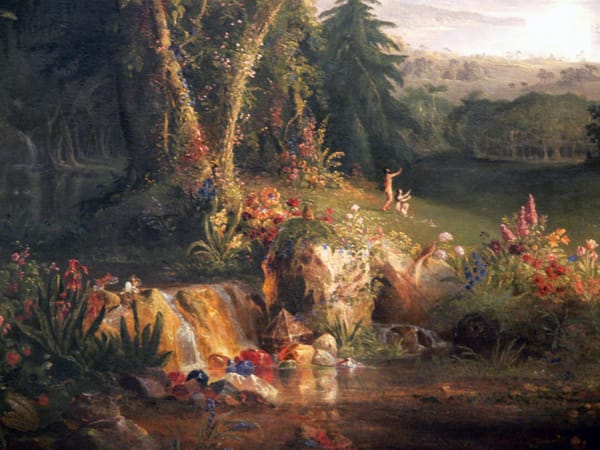Spellbound
What if instead of those musty spellbooks, living spells must be borne?

I am rather wilfully misconstruing and contorting the prompt of this month's RPG Blog Carnival on Beyond Vancian Magic: nothing is true except out is through.
I'm not enamoured with the aesthetics of tome-toting poindexter magicians, but I do enjoy the logistical implications of requiring our fine-fingered fantasists to account for their spells in encumbrance, as in games like Cairn and Knave. This grounds everyone's problem-solving arsenal and treasure in a shared resource to be managed, and is a more compelling explanation for be-robed casters than the notion that some armour will wreck their interpretive dance skills.
What if instead of those musty spellbooks, living spells must be borne? They take up encumbrance just as usual, for they add to the fat of your soul. I have kept a soft spot for the Binder class of Tome of Magic (D&D 3E), with its named and briefly storied vestiges. Animist magic also provides a few arguable gameplay advantages:
- Hunt for power. Seeking lost and fabled arcane texts to assimilate is a high water mark of player-emergent narrative, but most games also hand out freebies on levelling up and either permit or raise the option of duplicating/transcribing spells between practitioners. Curtailing this requires conceits like magic McGuffin ink, or just establishing that nearly all wizards are selfish gits. Instead, what if you sought out the living spell to negotiate with or otherwise subdue and bring to heel?
- Weird little freaks. If you listen to the podcast Between Two Cairns (and putting my cold-reading star-embossed conical hat on: you do), you will have heard them wax prosaic on the joy of having odd creatures of unusual personhood in our adventures. Living spells are a fantastic excuse to present alien and wilful minds, akin to mischievous faeries or those Zelda characters who are just completely obsessed with something you don't care about.
- World-building. I'd frame arcane spells as daemons/devils of Chaos, divine as angels and other celestial beings of Order, and primal/druidic as nature spirits of Balance (full-throated neutrality). This fleshes out how people socially relate to spell-casters based on the provenance of the powers they choose to entreat with.
Looking at the second-order implications of such possessing spells, I propose that harbouring such fugitives betwixt your glands and humours should have some... ramifications:
- Appearance. Each spell provides a tell-tale cosmetic tell, definitely marking you out as Cunning, and to those in the know implying the actual nature of the mystical powers you wield. This can be a slightly less disfiguring (or more - you do you) version of the corrupting magic idea in Dungeon Crawl Classics.
- Behaviour. Each spell also exerts its will upon the holder, adding a drive or personality trait to the stone soup of their inner dialogue. This likewise can be dialled up if desired to a Disco Elysium level of internal bickering and irrationality - just hand out the dissonant whispers around the table so the DM doesn't hog the fun!
- Cantrip. The only 'hard' mechanical change I'm proposing - let the host wield minor associated magics without expending a spell slot. These can probably just be adjudicated on the fly by common case law, the intention being about the potency of non-combat D&D 5E cantrips or otherwise effects you'd deeply regret having spent a slot on come the morning after.
When a spell is expended, the invested creature becomes unfettered for a time, until you next prepare yourself as a vessel and bind them once more. Does this soften the change to your appearance, quiet its braying upon your shoulder, or curtail your parlour tricks? Ask the stars. Want to play the game of unholy matrimony with your supernatural Sujimon? Skerples of course has got you covered with spell-breeding.
A Worked Example
To forestall the reasonable accusation that my blog remains all shirt and no trousers in the Department of Gameable Affairs (direct all correspondence to secretariat Joesky): here I flesh out how I might apply this to the six possible starting spells from Cairn 2E's character burner:
Detect Magic: You can see or hear nearby magical auras. Scintillating irides. Distractible. Magical script and runes glows faint in your presence.
Control Plants: Nearby plants and trees obey you and gain the ability to move at a slow pace. Verdant digits. Drawn to bask in sunlight. Plants gently part to make a path.
Thicket: A thicket of trees and dense brush up to 50ft wide suddenly sprouts up. Body hair of delicate thorns. Prickly. Mundane thorns cannot pierce your flesh.
Disassemble: Any of your body parts may be detached and reattached at will, without causing pain or damage. You can still control them. Joints settle in disturbing angles. Prankster. Hyper-mobile contortionism.
Read Mind: You can hear the surface thoughts of nearby creatures. Swollen cranium, shrunken ears. Intrusively inquisitive. Silently project own thoughts into other's minds within earshot.
Auditory Illusion: You create illusory sounds that seem to come from a direction of your choice. Resonant, booming voice. Overly theatrical. Louden or quiet nearby ambient noise.
I wouldn't work this all out for every spell before starting play - easier and more collaborative to develop as needed. There's no reason two casters needs to have precisely the same manifestations either: let players have their bespoke pieces of flair.




